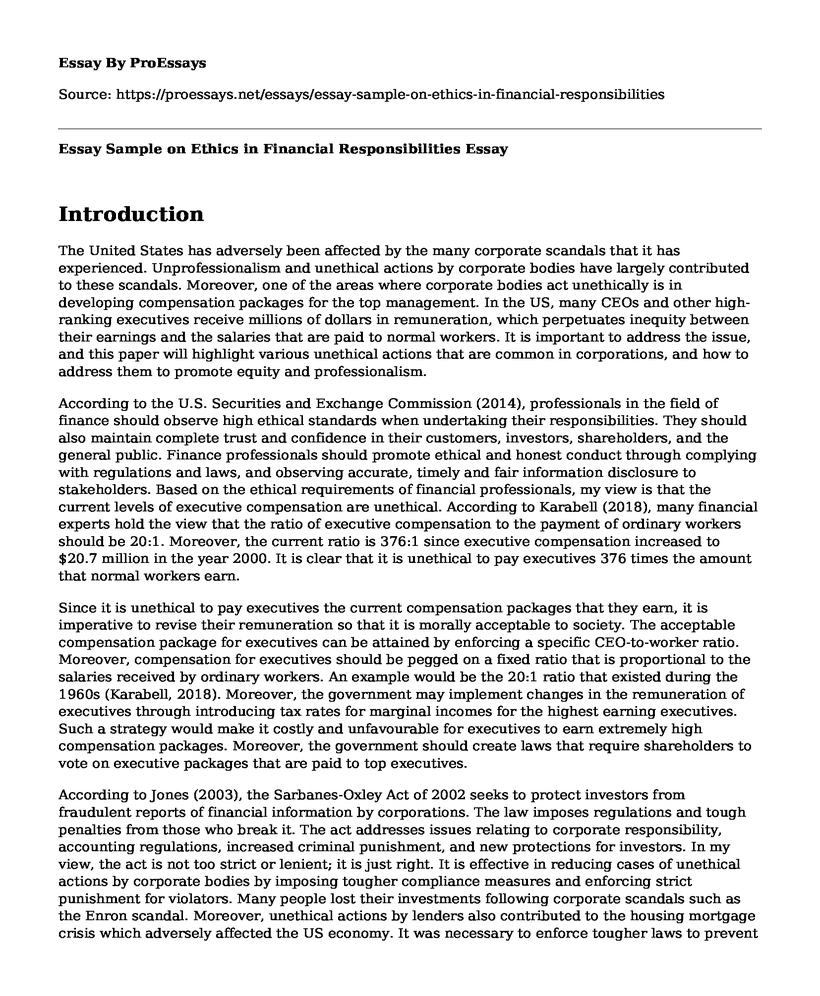Introduction
The United States has adversely been affected by the many corporate scandals that it has experienced. Unprofessionalism and unethical actions by corporate bodies have largely contributed to these scandals. Moreover, one of the areas where corporate bodies act unethically is in developing compensation packages for the top management. In the US, many CEOs and other high-ranking executives receive millions of dollars in remuneration, which perpetuates inequity between their earnings and the salaries that are paid to normal workers. It is important to address the issue, and this paper will highlight various unethical actions that are common in corporations, and how to address them to promote equity and professionalism.
According to the U.S. Securities and Exchange Commission (2014), professionals in the field of finance should observe high ethical standards when undertaking their responsibilities. They should also maintain complete trust and confidence in their customers, investors, shareholders, and the general public. Finance professionals should promote ethical and honest conduct through complying with regulations and laws, and observing accurate, timely and fair information disclosure to stakeholders. Based on the ethical requirements of financial professionals, my view is that the current levels of executive compensation are unethical. According to Karabell (2018), many financial experts hold the view that the ratio of executive compensation to the payment of ordinary workers should be 20:1. Moreover, the current ratio is 376:1 since executive compensation increased to $20.7 million in the year 2000. It is clear that it is unethical to pay executives 376 times the amount that normal workers earn.
Since it is unethical to pay executives the current compensation packages that they earn, it is imperative to revise their remuneration so that it is morally acceptable to society. The acceptable compensation package for executives can be attained by enforcing a specific CEO-to-worker ratio. Moreover, compensation for executives should be pegged on a fixed ratio that is proportional to the salaries received by ordinary workers. An example would be the 20:1 ratio that existed during the 1960s (Karabell, 2018). Moreover, the government may implement changes in the remuneration of executives through introducing tax rates for marginal incomes for the highest earning executives. Such a strategy would make it costly and unfavourable for executives to earn extremely high compensation packages. Moreover, the government should create laws that require shareholders to vote on executive packages that are paid to top executives.
According to Jones (2003), the Sarbanes-Oxley Act of 2002 seeks to protect investors from fraudulent reports of financial information by corporations. The law imposes regulations and tough penalties from those who break it. The act addresses issues relating to corporate responsibility, accounting regulations, increased criminal punishment, and new protections for investors. In my view, the act is not too strict or lenient; it is just right. It is effective in reducing cases of unethical actions by corporate bodies by imposing tougher compliance measures and enforcing strict punishment for violators. Many people lost their investments following corporate scandals such as the Enron scandal. Moreover, unethical actions by lenders also contributed to the housing mortgage crisis which adversely affected the US economy. It was necessary to enforce tougher laws to prevent such scandals in future, since the existing laws were weak. The Sarbanes-Oxley Act of 2002 has attained this goal by increasing accountability by corporations and protecting stakeholders such as employees and investors from financial ruin.
Conclusion
In conclusion, the compensation packages that top executives in the US receive are unethical since they expose the huge disparity between earnings by CEOs and those of ordinary employees. The government should address this issue through increasing taxes for the top management teams that receive extremely high compensation packages. Additionally, it should empower shareholders to vote o payment schemes that to executives should be subjected to. Moreover, the Sarbanes-Oxley Act of 2002 has played an integral role in addressing unethical actions by corporations and it has help them accountable for unethical and illegal business practices.
References
Jones, R. M. (2003). "The Sarbanes-Oxley Act of 2002: A primer". Business Torts Journal, 10(3), 18-21. Retrieved http://apps.americanbar.org/litigation/committees/businesstorts/docs/journal_sample_sarbanes.pdf
Karabell, S. (2018). "Executive Compensation is Out of Control. What Now?" Forbes. Retrieved from https://www.forbes.com/sites/shelliekarabell/2018/02/14/executive-compensation-is-out-of-control-what-now/#2b4c0ae7431f
U.S. Securities and Exchange Commission. (2014). Code of Ethics for Financial Professionals. Retrieved from https://www.sec.gov/Archives/edgar/data/1331757/000133175714000024/codeofethicsforfinancialpr.htm
Cite this page
Essay Sample on Ethics in Financial Responsibilities. (2022, Dec 17). Retrieved from https://proessays.net/essays/essay-sample-on-ethics-in-financial-responsibilities
If you are the original author of this essay and no longer wish to have it published on the ProEssays website, please click below to request its removal:
- Measuring Safety's Return on Investment Essay
- Rebuilt Title Car Isn't Bad Essay Example
- Codification Improvements to Financial Instruments: Credit Losses Paper Example
- Needs Assessment Management of Banco de Credito del Peru Paper Example
- The Federal Reserve System Essay Example
- Why People Commit Fraud - Essay Sample
- Essay Example on Unlock the Secrets of Value Investing: The Money Machine







